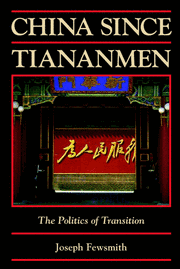Book contents
- Frontmatter
- Contents
- Acknowledgments
- Chronology
- Schematic Overview of Chinese Political Spectrum
- List of Abbreviations and Tables
- Introduction: State and Intellectuals at the Turn of the Century
- Part I Line Struggle Revisited: The Attack on Deng's Reform Program
- Part II Redefining Reform: The Search for a New Way
- 3 The Emergence of Neoconservatism
- 4 The Enlightenment Tradition under Challenge
- 5 The Emergence of Neostatism and Popular Nationalism
- Part III Elite Politics and Popular Nationalism
- Conclusion
- Epilogue
- Notes
- Bibliography
- Index
5 - The Emergence of Neostatism and Popular Nationalism
Published online by Cambridge University Press: 05 September 2012
- Frontmatter
- Contents
- Acknowledgments
- Chronology
- Schematic Overview of Chinese Political Spectrum
- List of Abbreviations and Tables
- Introduction: State and Intellectuals at the Turn of the Century
- Part I Line Struggle Revisited: The Attack on Deng's Reform Program
- Part II Redefining Reform: The Search for a New Way
- 3 The Emergence of Neoconservatism
- 4 The Enlightenment Tradition under Challenge
- 5 The Emergence of Neostatism and Popular Nationalism
- Part III Elite Politics and Popular Nationalism
- Conclusion
- Epilogue
- Notes
- Bibliography
- Index
Summary
Although the previous chapter laid out the major differences between postmodernists and liberals, attention was focused primarily on differences in their world views. To that extent, the discussion was fairly abstract, as are many of the writings in this genre. This chapter focuses on more specifically political issues that have arisen parallel to the discussions described in Chapter 4. In particular, we focus on two issues that at first glance appear to be contradictory: the emergence of a body of neostatist thought that has revolved around the issue of “state capacity” on the one hand, and the emergence of populist nationalism on the other. Chapter 3 discussed the nationalism of people like He Xin and the recentralizing impulses of people like Chen Yuan. However, even though He Xin's tone was populist, he was so obviously directing his views upward (toward the leadership) that he never tested the popular basis for his views. Similarly, although Chen Yuan sought ways to combine market economics with a stronger central government, he never developed a systematic conceptual approach. These limitations condemned the neoconservatism of the 1989–92 period to the margins of Chinese intellectual life, even as it expressed a prevalent mood within a segment of the political leadership.
By 1992–93, however, as noted in the previous chapter, the economic and social bases had developed for a broader intellectual acceptance of postmodernist ideas that would have been considered “conservative” only a few years earlier.
- Type
- Chapter
- Information
- China since TiananmenThe Politics of Transition, pp. 132 - 156Publisher: Cambridge University PressPrint publication year: 2001



